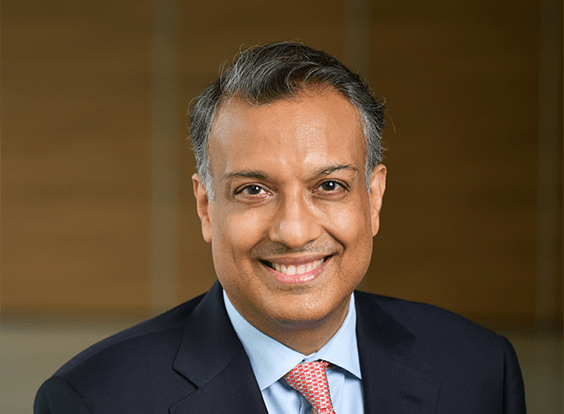The company plans to divest assets to raise capital for new projects, chief executive says
India's ReNew, a subsidiary of New York-listed ReNew Energy Global, is exploring green hydrogen projects in markets such as Egypt as part of diversifying its operations internationally, according to its chief executive.
The company, which has been funded by investors including the Canada Pension Plan Investment Board and the Abu Dhabi Investment Authority (Adia), still plans to develop most of its green hydrogen projects in India, the world’s fifth-largest economy, Sumant Sinha told The National on the sidelines of the Cop28 climate summit.
“We also want to do some project development outside India because it's important for us to have some diversification because hydrogen is going to be a more globally traded business, unlike renewable energy,” Mr Sinha said.
“Anybody who's looking around knows that you have to get into countries where there's good natural resource, where land is not that expensive, and which are [closer] to markets."
In line with that, the company is seeking projects in the Middle East, North Africa, India and Australia, the executive said.
Hydrogen is expected to become a critical fuel as economies and industries make the transition to a low-carbon world.
It comes in various forms, including blue, green and grey. Blue and grey hydrogen are produced from natural gas.
Green hydrogen production involves a process in which an electrolyser uses electricity to separate water molecules into hydrogen and oxygen.
As part of India’s National Green Hydrogen Mission, the country aims to produce five million tonnes of the fuel annually by 2030, with the potential to reach 10 million tonnes as export markets grow.
ReNew, which generates about 1.8 per cent of India's annual electricity production, has a combined capacity of 13 gigawatts in wind and solar power, including projects in the works.
The development of solar projects worldwide stalled last year due to supply chain bottlenecks and strict lockdowns in China, the world’s largest manufacturer of solar components.
ReNew faced shortages of a key raw material used in solar panels called polysilicon.
“The polysilicon capacity has been ramped up very substantially and solar module prices have gone down beyond what we had expected,” Mr Sinha said.
“The issue, however, is not disruptions. The issue really is [the] concentration of solar supply chains, and suppose if some event happens, like another global pandemic or a geopolitical event, then the whole world depends on one country for 90 per cent of solar modules,” he said.
The company, which is looking at divesting its assets to raise capital, will continue to tap into debt and equity markets to finance renewable energy projects and new business areas, Mr Sinha said.
In April, ReNew Energy’s subsidiary, Diamond II Limited, raised $400 million through the issue of senior secured green bonds.
“I don't think we'll do any parent-company-level raising," he said.
India is aiming for 500 gigawatts of renewable energy capacity by 2030 as it seeks to reduce its dependence on expensive imports of polluting fossil fuels.



